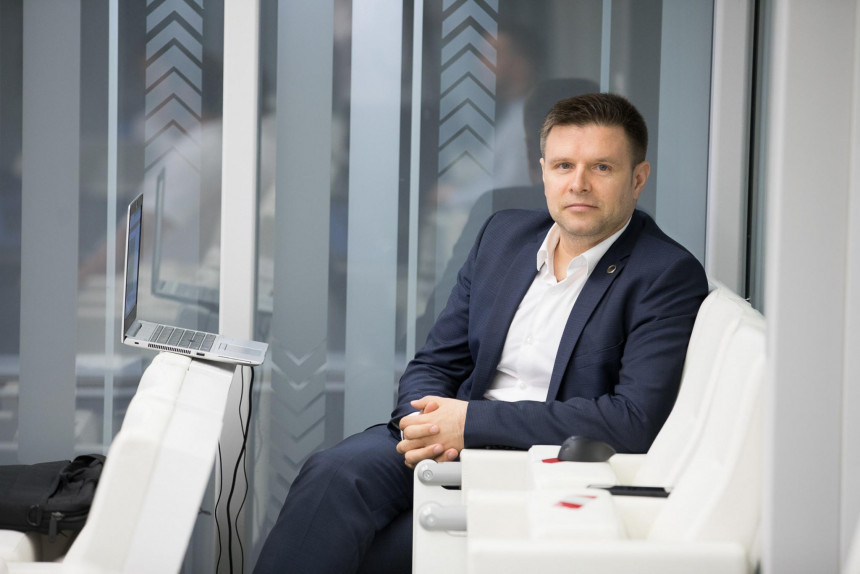MP Juris Rancāns explains whether there will be criminal penalties for Covid-19 fake news

Without being able to control the spread of Covid-19, there is growing public debate about whether it would not be appropriate to introduce a separate penalty for non-compliance with epidemiological safety measures. The Saeima will address this issue after the approval of next year's state budget.
News agency LETA, quoting an interview on Latvijas Radio with the Chairman of the Saeima Defense, Internal Affairs and Corruption Prevention Committee Juris Rancāns (New Conservative Party, Jaunā konservatīvā partija), reports that criminal liability could be envisaged for non-compliance with Covid-19 restrictions.
According to the agency, J. Rancāns has said that in a couple of weeks the Saeima Criminal Law Subcommittee could start evaluating the Criminal Law in order to ensure liability for calls not to observe the Covid-19 restrictive measures.
"I think that a special norm could be created, instead of improving on the one that defines the punishment for hooliganism. I would even go further, namely that the new norm should be structured and liability should be determined in the same way as provided for in the Criminal Law on Incitement to Genocide. Namely, the new norm would provide for liability simply for the call, without expecting that any consequences will occur,” the Saeima deputy was quoted.
However, in a conversation with Neatkarīgā, he states that he was misunderstood and that what he said was taken out of context.
The idea of introducing a norm in the Criminal Procedure, which provides a penalty for non-compliance with the measures restricting Covid, is being considered. In your opinion, should this be done by extending the article on hooliganism, or by introducing a completely new norm?
In the interview with Latvijas Radio I answered the question of journalists whether an additional liability norm should be considered for publishing fake news and calls for non-compliance with epidemiological safety requirements. I answered that it is planned to talk about it in the Saeima Criminal Law Subcommittee, because the media regularly ask questions whether such a norm shouldn’t be introduced here, the way it already is in other countries. This will definitely be discussed and experts will be consulted, but I would like to emphasize that in the interview with Latvijas Radio I used a comparison with criminal law, but in general I am talking about administrative liability. Until now, discussions on the introduction of liability for the dissemination of so-called fake news have taken place in the Subcommittee on Drafting Criminal Procedure Law of the Legal Affairs Committee. At the time, law enforcers, the police, the prosecutor's office and judges told us that this type of activity could be qualified under the Criminal Law as hooliganism, which is also being actively pursued and is now being developed.
What punishment would you propose?
Administrative liability could be given for a call for non-compliance with epidemiological safety requirements. But decision-makers should first hear all the experts and find out the current situation after the budget has been adopted. It is important to understand how big the problem is, whether people are really following such calls and really disobeying the rules of epidemiological safety because someone urged them. There should be a causal link between the call and the actual action. If experts and the police say that there is indeed a great deal of influence from so-called opinion leaders and social networks, then one can start thinking of introducing further liability. If, in the opinion of specialists and experts, a special norm in the Criminal Law would be necessary, then its implementation could also be considered. However, if its impact is not so great, the existing regulation can remain. However, it will certainly not be the case that a political decision can be made without a deeper analysis, to simply implement it for the sake of implementation.
How long would it take to decide whether or not to impose liability?
The urgency of the decision also depends on what experts and specialists tell us. The political decision is taken by listening to all parties, both those who say it is necessary, NGOs and members of the opposition, who will say that the introduction of such responsibilities will be a restriction on human rights. It does not matter that the representatives of the Ombudsman's Office had previously told us in the Committee that the introduction of limitations and liability would be proportionate in these circumstances. Those who do not want to hear it do not listen to it. But in any case, everyone has a say, and then Members decide whether or not to take such a decision.
Do you think that KPV LV, which is in charge of the Ministry of the Interior, whose leader has so far opposed the introduction of penalties, will be able to be persuaded on the introduction of such penalties?
The political process will show results. Before that happens, it's hard to predict what they will be like. I do not agree with the conspiracy theory that the government and the Saeima have a political will to ban someone from speaking or restrict freedom of speech. There is a need to distinguish between two things: freedom of expression and criticism, which means that people can and may speak, express their views on any decisions that they consider wrong, but it’s another thing to endanger others, to call for non-compliance with epidemiological safety rules. None of those who do not comply with these rules have the right to infect others. The human rights of those who call for non-compliance with epidemiological safety rules end where other people's right not to be infected in public begins. And it is the task of the state to prevent the spread of the infection and to do everything to keep people safe. By that I mean that no one is going to restrict freedom of expression, you can criticize it, but the rules of epidemiological safety must be respected.
